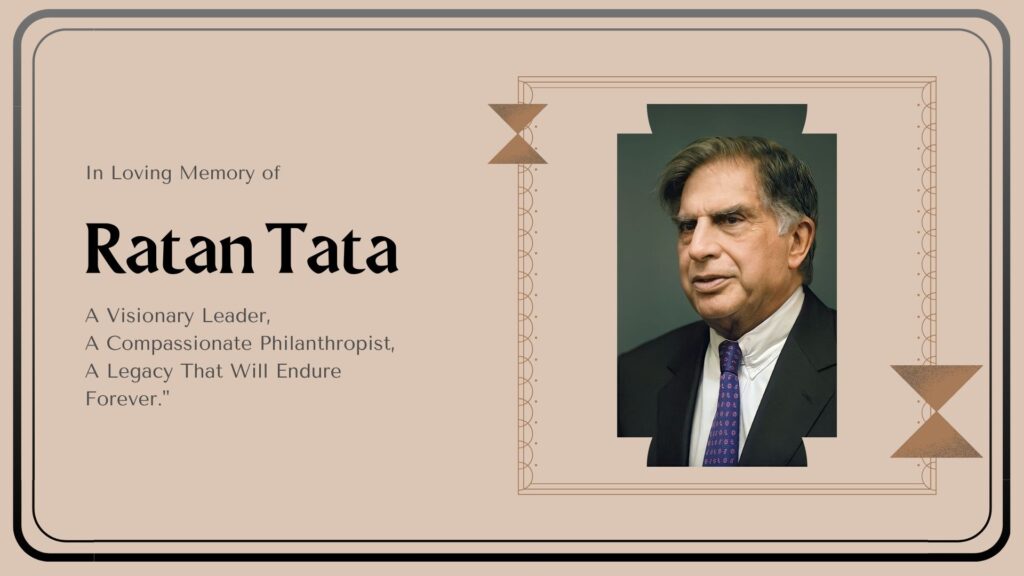Ratan Tata Passes Away at 86: A Nation Mourns the Loss of India’s Legendary Business Titan and Philanthropist
4 min read
One of the most loved figures in India, Ratan Tata passed away on October 9, 2024, at the age of eighty-six. His departure signals the closing of the curtain on the significance of both business and philanthropy, as there were great contributions from Tata to India and the world of business. The man who served as the chairman of Tata Sons not only expanded the scope of activities of the Tata Group but also established a new direction in business, based on principles of decency, modesty, and care for the society.
Early Life and Career
On 28th December 1937, one of the most notable family members, Ratan Tata was born, the Tatas who had wealth creators and philanthropists in their blood. True to his family traditions, Ratan did not embark on a similar career path. Upon his graduation from Cornell University with a degree in architecture, Tata began working at Tata Steel in the year 1961 as a clerk and progressed through the ranks upward. Scholars refer to this characteristic as his down to earth leadership experiences as he was very modest and able to start low without embarrassment. In 1991, he was appointed as the chairman of Tata Sons, since then for two decades, he built the Tata Group with revenues over 100 billion dollars when he retired in the year 2012.

Legacy as a Business Leader
‘For Ratan Tata as the Chairman of Tata Group, it was the time to witness the greatest events in the history of Indian Business.’ Investors stuck with him even as the Tata Group made exorbitant acquisitions of updated British companies such as Tetley Tea, Jaguar Land Rover, and Corus Steel. These investments were representative of Indian multinational conglomerates making their presence felt on a global stage and the aspirations of Ratan Tata were instrumental in giving India this prominence.
The year 2008 saw a landmark achievement for him in the introduction of the Tata Nano. The cheapest vehicle in the world, the Nano, was embraced by Tata as an initiative to make transportation available to the average person. While such revenue was not forthcoming, it was an entirely new idea that came from Ratan Tata’s appetency of establishing business as a solution to social challenges that he saw looming.
Commitment to Philanthropy
The Philanthropic Society, the business of Ratan Tata is likewise quite renowned. Based on Tata Trusts, he invested billions in various areas such as health care, education, and the improvement of living conditions in the countryside. That’s because Tata Trusts – one of the biggest charity organisations – owns 66 percent of Tata Sons which means most of the profits of the company are ploughed back in charity.
One of his key areas of focus was his $50 million donation to Cornell University, his alma mater, which was used for agricultural studies and the establishment of the Tata-Cornell Institute for Agriculture and Nutrition. He was also instrumental in establishing Tata cancer hospitals and many educational institutions in the country, which showed that he was not only a businessman but also a man with a larger vision than just sitting in boardrooms.
The Man Behind the Leader
Ratan Tata, for all his towering accomplishments, was quite humble and soft spoken. He lived a rather austere life and chose not to be in the public glare. Most people remember him interacting with employees and they share with us encased images when he treated everyone with respect irrespective of their positions. He had a very engaged style of leadership and was seen taking active participation in important matters like the nano project.
Ratan Tata never married though he opted to live a fairly solitary life. He never hesitated to share the fact that he had a keen interest in flying and had a love for architecture as well. Such possessions helped shape his business orientation whereby for instance, he gave much attention to design and invention.
Tributes Pour In
Tributes from leaders all over the world started to pour in immediately after the news of his death spread in the same way as an epidemic. N Chandrasekaran, Chairman of Tata Sons resented such individuals and came up with a funny statement and said,“He led through the force of example and with steadfastness to ideals of excellence, integrity and innovation.” Industry heavyweights Mukesh Ambani and Anand Mahindra expressed their grief and called Tata a man with a mission, who changed the face of Indian business and bequeathed a legacy of love and vision.
He may no longer walk among us in the Indian business landscape, however his memory is relevant as ever among the entrepreneurs of many generations, not only owing to his business competence but to his principles of honesty, morals and responsibility.
Conclusion
It is safe to say that Ratan Tata’s demise will affect both India and the globe. Tata developed great strategies and dedications as a successful business leader, charitable individual and a genuine human being. In this way, he demonstrated that businesses are a force of good for the common good, creating benefits for society over and above the economic benefits accruing from owners. It is this leadership that will guide many generations to come and the impact he made on the growth of India will be remembered for decades and decades.
With loss comes mourning and abhorring those who misadvised them, an innovator, a king and most of all, an altruist who devoted himself to the redeeming of the world.





